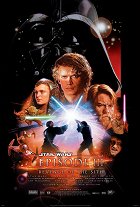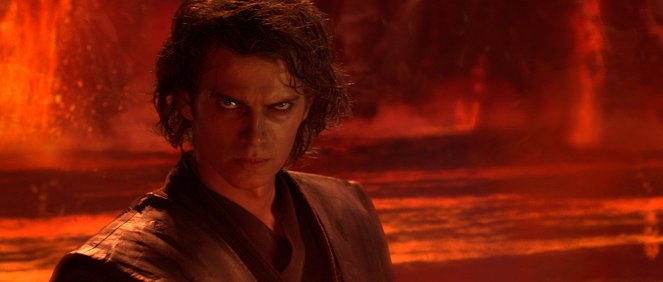Directed by:
George LucasScreenplay:
George LucasCinematography:
David TattersallComposer:
John WilliamsCast:
Ewan McGregor, Natalie Portman, Hayden Christensen, Ian McDiarmid, Samuel L. Jackson, Jimmy Smits, Frank Oz, Anthony Daniels, Christopher Lee (more)VOD (3)
Plots(1)
The galaxy is weary after three long years of war. Anakin Skywalker and Obi-Wan Kenobi have become legendary heroes in their campaigns against the droid forces of the evil General Grievous. Anakin and his secret wife, Padme Amidala, have been separated for months, and he finally reunites with her to learn that she is pregnant. He is plagued by visions of her dying in childbirth, haunting images of a possible future. Anakin is determined to stop her from dying--no matter the cost. This leads Anakin down a dark path to commit terrible deeds. Obi-Wan Kenobi must face his former apprentice in a ferocious lightsaber duel on the fiery world of Mustafar. (official distributor synopsis)
(more)Videos (1)
Reviews (13)
Episode III is a desperate fugue in which the wandering torso of the Jedi order tries to patch up what it can to end up in utter disillusionment and agony. Lucas indulges the viewer with his spectacular tricks, but almost from the beginning of the film, he amplifies an evil hunch and amplifies the dark undertone that culminates, both audibly and visually, in a scene where Anakin makes a fatal decision in the abandoned Jedi Temple to help his seducer Palpatine. Although George Lucas is a mediocre director, this scene and several others (especially the destruction of the Jedi) are among the most emotionally powerful in the six-part series. In Episode III, he manages to maintain a rhythm and pace that escalates brilliantly towards the end to the wild staccato of hopeless scenes that form the imaginary highlight of the new trilogy. It is unusually naturalistic and completely resonates with the new atmosphere that Star Wars has received both through new episodes and, above all, with a series of computer games. The impression is monstrous, urgent, immediate. There's not much to add – Revenge of the Sith is proof that all the mistakes of the previous two films were worth it, as they built the bridge to the truly grand finale. Complaints – the action scenes are too stretched and suffer from the classic visual gluttony of the digital age, of which Lucas is the guiding spirit. Too many colors and effects lead to clutter. John Williams' music is kind of stiffened, but it works at key moments. Yes, and then the few reminisces of incredibly starchy love dialogues. But very few. Too few to ruin an episode that really doesn't have to be ashamed to be in the company of A New Hope and The Empire Strikes Back.
()
Peter Jackson said that the first two Lord of the Rings movies were made so that the third one could exist. However, such a statement better applies to Star Wars. It is surprising how Episode III gradually changes form – it starts out in the spirit of the popcorn flicks Episode I and Episode II, then begins to take on the style of the original trilogy, and ends in such a way that you have a powerful need to see Episode IV. This transition shows us why the two preceding volumes were so weak dramatically and confirms WHO the main “hero” of the whole saga is and WHAT the most important element of a narrative fantasy film is. In Jackson’s case, it was Sauron; for Lucas, it’s Darth Vader. In filmmaking terms, Episode III is better than the two previous episodes only in the last 20 minutes (which reach the dramatic level of Episode V). The rest of Episode III is more engaging not because it was written or filmed with greater skill, but because it’s about something. What would The Fellowship of the Ring be if Sauron hadn’t been mentioned in it and depicted as the greatest and most powerful evil? It would be good to edit Episode I and Episode II into a single two-hour prequel and start the saga that we all love with Episode III. May the Dark Side be with you, Anakin!
()
One film legend says that there was a fundamental difference in the approach to the world of cinema among the three most influential filmmakers of the 70s, namely Spielberg, Coppola, and Lucas. While Spielberg and Coppola literally lived for movies, exhaustively watched the performances of acclaimed film classics in film clubs, passionately discussed cinema with similarly affected individuals late into the night, and tried to push the world of film forward, Lucas was an enthusiastic reader of outdated comics, a viewer of 1950s TV space operas, and film theory was inherently foreign to him. However, he was able to capture the essence of popular culture and the transformation of the film audience from the 40s to the 70s, when the average age of cinema-goers continued to decrease. At the same time, due to sociological processes and the enrichment of society, there was a change in the perception of film. The infantilization fully manifested itself and the concept of a family film with a lower standard prevailed to be understood by a wider range of potential viewers. This is how Star Wars came into being, where a fairytale was wrapped in cosmic technology and the nonsense of the then-popular New Age movement. Lucas filmed it as visually and naively as possible, and precisely because of that, it had such a penetrating success. What succeeds attracts attention and the desire to imitate, and at a certain stage, when it becomes a cult, it is practically unquestionable and by itself carries the seal of quality regardless of its content. I saw the first three films of the famous series at an age when I found the motifs and execution, especially the "intellectual superstructure," laughable. Otherwise, the course of events is such that you see it for the first time at the age of 8-9, and then with an iron regularity, so you grow up with it and it has emotional and nostalgic value for you. Even if I grew up with it, I still would have most likely become a fan of the Star Trek series, which, despite its clichés, naivety, and the ideological basis that stems from multiculturalism, represents an honest work from the sci-fi genre. Star Wars only shares the space settings with the sci-fi genre. It is a fairytale fantasy that is neither clever nor innovative nor brilliantly directed. The later three episodes of the series are loaded with bombastic special effects, but they are more childish than anything, and they also lack the confident ironic detachment that emanates from every smirk of Han Solo. His portrayal by Harrison Ford somewhat resembles the much more pronounced ironic detachment of the Indiana Jones character. Personally, the entire series has nothing to offer me, and although there are understandably significant nuances between each film, what bothers me, such as the frenzied waving of lightsabers, the babbling about the Force, and the cute plush creatures as extraterrestrials, are typical of all the episodes. Therefore, this commentary applies to all parts of the Star Wars series. Overall impression: 20% for the set design.
()
(less)
(more)
Dramaturgically, it’s much more mature and immersive than the two previous episodes. It’s incredibly spectacular and dynamic in its individual attractions, which exquisitely heightens the atmosphere and, for the first time in the new trilogy, revels in fatality and visual darkness. While Lucas is absolutely incapable of any psychological level, and SW in his hands remains a cold showcase of intergalactic filmmaking possibilities and worlds, this instalment at least has the narrative balls and verve to make me gladly forgive him for the mechanical dialogue or the dull character shift by the awful Christensen. It's got major conflict, pivotal moments of the entire saga, and an ultra-cool Yoda and Obi-Wan whose separate story-arcs, capped by two parallel and iconic duels, I would sketch in the starry sky at night and always watch before falling asleep. The transition to A New Hope is finally completed, George Lucas, you have my respect...
()
The dark side of the Force suits it. Even so, I don’t think even retrospectively that it makes any more sense than the previous ones; quite the opposite, in the light (excuse me, “the darkness") of this episode I find that the absolute superfluousness of the saga becomes even more obvious. The imbalance in pace is a huge mistake. The first fifteen minutes involves a monumental battle, then we get a boring hour with starched amateur dramatic dialogs and then during the last hour it turns into a serious drama with convincing (as far as the Star Wars universe is concerned) characters. Too bad that the transformation of Anakin into Vader seems unbelievable and rushed. The idea that this mentally unstable character was in fact the embodiment of living charisma that we know from the original trilogy is ridiculous. The weaker moments are saved by the stylish over-acting of Ian McDiarmid. The greatest faux pas is that, although this was supposed to be emotionally tense due to the tragic context, sadly the opposite is true. While on screen we see something technically impressive, it leaves you absolutely cold.
()



Ads